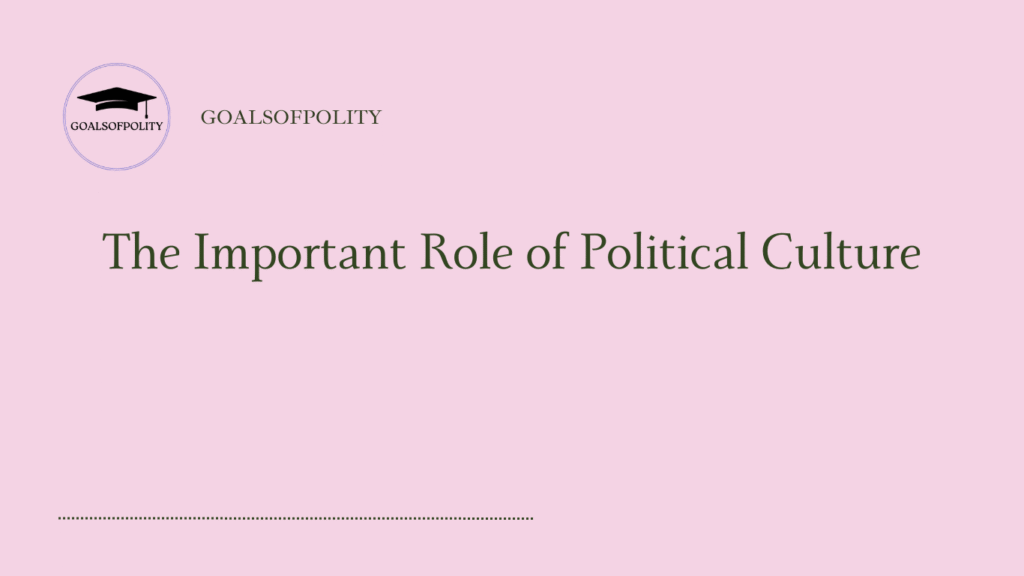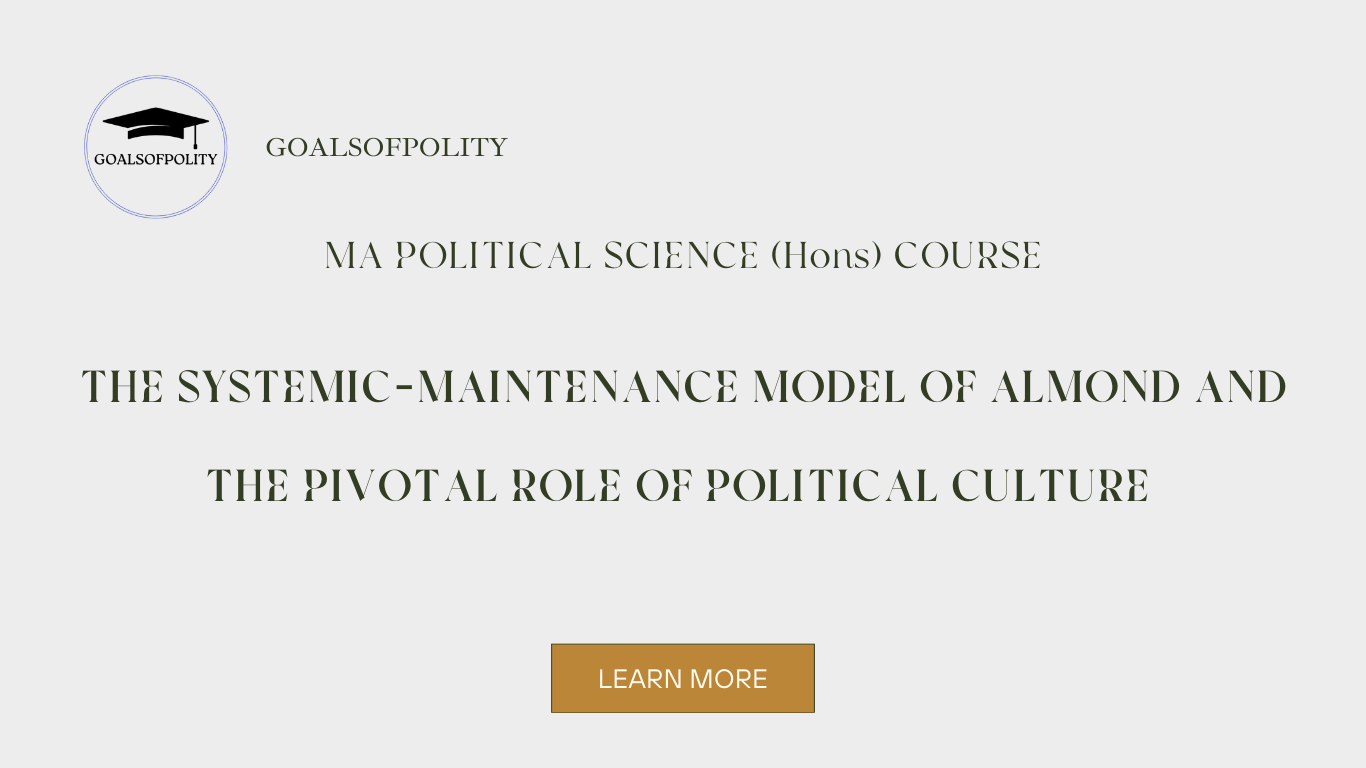Table of Contents
Gabriel Almond, a renowned comparative theorist, developed the Systemic-Maintenance Model to explain how political systems function, adapt, and maintain themselves over time. His model highlights the interdependence of various subsystems and the importance of political culture in maintaining the system’s stability and legitimacy. Almond’s model views a political system not as a static structure, but as a dynamic and living organism that constantly interacts with its environment to survive and evolve.
1. The Core Idea of the Systemic-Maintenance Model
The central concern of Almond’s model is the maintenance and stability of political systems. According to him, every system must perform certain functions to cope with internal and external challenges. These functions ensure that the system remains cohesive, legitimate, and capable of meeting the demands of society.
The concept of systemic maintenance refers to the system’s ability to preserve its identity and structural integrity while also managing conflicts, pressures, and environmental changes. It is through this process of adaptation and response that a political system ensures continuity and avoids breakdown or collapse.
a. Structural-Functional Analysis:
Almond employed a structural-functional approach, inspired by the sociological theories of Talcott Parsons. He argued that, like social systems, political systems are composed of structures (institutions and actors) that perform specific functions essential for the system’s survival.
He identified two categories of functions that maintain a political system:
i. Input Functions:
These functions involve how demands and support enter the system. They include:
- Political socialization and recruitment: The process by which citizens acquire values, beliefs, and attitudes towards the political system, ensuring continuity.
- Interest articulation: The expression of needs and demands by individuals and groups.
- Interest aggregation: The combining of diverse demands into coherent policy options by parties and groups.
- Political Communication: The exchange and flow of information between the public and decision-makers.
ii. Output Functions:
These relate to how the system transforms inputs into authoritative decisions. These include:
- Rule-making: The creation of laws and policies.
- Rule application: The implementation of laws by administrative bodies.
- Rule adjudication: The interpretation of laws and resolution of conflicts through judicial processes.
These input and output functions together form a feedback loop – a mechanism that ensures the system’s adjustment and responsiveness.
b. The Central Role of Political Culture:
A key innovation in Almond’s model is the inclusion of political culture as a crucial factor in maintaining the system. Political culture refers to the collective attitudes, values, feelings, and beliefs of citizens towards the political system and its institutions.
According to Almond, political culture plays a stabilizing role by shaping how people perceive authority, participate in decision-making, and evaluate legitimacy. It is the psychological and emotional foundation upon which institutions rest.
He categorized political cultures into three types:
- Parochial culture: Citizens have limited awareness of or concern for the political system (common in traditional societies).
- Subject culture: Citizens are aware of political structures but remain largely passive or obedient to authority.
- Participant culture: People participate in politics, are informed, and actively engaged.
Almond argued that for a system to be effectively maintained, there must be a balance among these orientations, resulting in a civic culture – a blend of participation, obedience, and trust that fosters stability without rigidity.
c. System Maintenance and Adaptation:
The model emphasizes that political systems must adapt to social changes, such as modernization, technological advancements, or shifts in public values. A strong and coherent political culture enables adaptation without losing legitimacy.
For example:
- When demands increase due to social mobilization, the system must adapt through reforms or policy innovations.
- If there is a gap between expectations and performance, the political culture helps mediate by maintaining patience, trust, or support until changes occur.
Thus, political culture acts as both a buffer and a lubricant—preventing the system from collapsing under pressure and facilitating smooth transitions.
d. The Importance of Feedback Mechanisms:
In Almond’s model, feedback plays a crucial role in system maintenance. Through feedback, leaders and institutions receive signals about public satisfaction, dissatisfaction, or support. When feedback is properly managed, systems can correct errors, adapt policies, and maintain their legitimacy.
If feedback fails—due to censorship, corruption, or alienation—the political culture can weaken, leading to instability or system breakdown. Therefore, institutional accountability and citizen participation are interdependent factors that maintain the system’s equilibrium.
2. The Important Role of Political Culture

Political culture, a concept closely associated with Almond and Sidney Verba, plays a central role in the system-maintenance model. It describes the set of values, traditions, attitudes, and ideas that influence the way people interact with and view the political system.
a. Definition and Types of Political Culture:
Almond and Verba identified three categories of political culture:
Narrow culture: characterized by limited awareness of or interest in the political system. Found in traditional or tribal societies.
Subjective culture:
- Although most citizens are passive and subservient to authority, they are nevertheless aware of the political system.
- Typical of authoritarian regimes.
Participative culture: Citizens actively participate in political processes, expressing opinions and demanding accountability. This is the norm for democratic systems.
A “civic culture” that balances stability and participation is the result of most cultures showing a combination of these types.
b. The effects of political culture on systemic – maintenance:
Legitimacy and stability: A shared political culture promotes system legitimacy by linking citizens’ expectations with the performance of institutions.
Participation and support: The level of public support and participation, which is necessary to maintain democratic institutions, is determined by political culture.
Conflict resolution: A culture that promotes dialogue, compromise, and tolerance facilitates the management of conflicts and prevents systemic breakdown.
c. Interdependence of political culture and institutions:
Institutions are shaped by and are shaped by political culture. For example, democratic institutions flourish in a culture of participation and accountability, while authoritarian institutions flourish in a localized or subservient environment.
3. Evaluation of the Model
Advantages:
- Provides a comprehensive framework that integrates structure, function, and culture.
- Emphasizes system stability and adaptability rather than merely institutional descriptions.
- Highlights the importance of citizen attitudes and cultural orientations in political performance.
Criticisms:
- The model has been criticized for being overly abstract and functionalist, assuming harmony and neglecting power struggles.
- It places too much emphasis on stability and underestimates revolutionary or transformative change.
- Its universal applicability is questioned, as it was largely based on Western democratic experiences.
4. Relevance of the model in contemporary politics
Despite the criticisms, Almond’s system-maintenance model remains relevant in understanding how modern systems manage stress, maintain legitimacy, and adapt to change. In an era of rapid globalization, digital communication, and increasing citizen activism, political culture remains a key determinant of whether governance will endure or collapse.
Where trust, participation, and legitimacy are strong, systems thrive; where they are weak, even the most sophisticated institutional structures struggle to survive. Almond’s insight that “culture sustains structure” is one of the most enduring lessons of comparative political analysis.
Conclusion:
Almond’s system-maintenance model emphasizes that no system can endure solely through coercion, laws, or administration—it must be rooted in a shared political culture that fosters legitimacy and trust. Systems achieve a delicate balance between change and continuity, ensuring their long-term stability and effectiveness through the harmonious interplay of structures, functions, and cultural values.
FAQs: The Systemic-Maintenance Model of Almond and the Pivotal Role of Political Culture
Question 1. What is Almond’s systemic-maintenance model?
The systemic-maintenance model, proposed by political scientist Gabriel A. Almond, is an analytical framework that explains how political systems survive and remain stable over time. It emphasizes that a political system is not simply a set of institutions, but rather an integrated entity that performs the functions—such as political socialization, recruitment, and communication—necessary to continue operating despite internal and external constraints.
Question 2. How does Almond’s model differ from David Easton’s systems theory?
While David Easton’s systems theory focuses primarily on inputs, outputs, and feedback mechanisms within the political system, Almond’s model places greater emphasis on political culture and the maintenance of systemic functions. Almond integrates the role of social values, beliefs, and norms into understanding how political systems maintain themselves, thus linking the structural and cultural dimensions of politics.
Question 3. What is meant by the ‘crucial role’ of political culture in Almond’s model?
According to Almond, political culture is what binds a political system together. It refers to the shared values, norms, attitudes and orientations towards politics that influence citizens’ behaviour and institutional performance. A supportive political culture ensures stability by promoting legitimacy, encouraging citizen participation and reducing conflict, while a fragmented political culture can undermine systemic maintenance.
Question 4. What are the main functions of systemic maintenance according to Almond?
Almond identifies several key functions required for systemic maintenance:
Political socialisation – the communication of political values and norms to new generations.
Political recruitment – the introduction of new individuals into political roles.
Political communication – facilitating the exchange of information between the public and the government.
These functions ensure that the political system can reproduce itself, adapt to change and maintain legitimacy.
Question 5. How does political culture affect systemic stability?
Political culture shapes citizens’ expectations of their government, individuals’ willingness to obey laws, and the level of trust in political institutions. People living in a stable political culture generally accept the legitimacy of the political system and cooperate with its institutions, thereby reinforcing systemic maintenance. On the other hand, a culture of distrust or alienation can lead to instability and illegitimacy.
Question 6. What types of political cultures did Almond and Verba identify?
In “The Civic Culture” (co-authored with Sidney Verba), Almond classified political culture into three main types:
Narrow political culture – low awareness or involvement in politics.
Subjective political culture: Citizens are aware of the political system, despite their general passivity.
Participatory political culture – citizens actively participate in and influence political processes.
A balanced combination of these, called civic culture, is thought to best promote systemic maintenance.
Question 7. Why is systemic maintenance important in comparative politics?
In comparative politics, systemic maintenance is important for explaining why some political systems persist while others collapse. Almond’s model provides tools for analyzing stability not only through institutional efficiency but also by examining cultural underpinnings, helping scholars understand patterns of political development, democratization, and authoritarian persistence.
Question 8. Can both democratic and non-democratic systems use Almond’s model?
Yes. Almond designed his model to apply to all political systems – democratic, authoritarian, or transitional. In non-democratic systems, systemic maintenance may rely more on coercion and controlled political culture, while in democracies, it relies on legitimacy, participation, and pluralism.
Question 9. What aspects of Almond’s systemic-maintenance model are criticized?
Critics argue that Almond’s model is functionalist, sometimes assuming that political systems naturally work toward stability. It has also been criticized for underestimating the importance of conflict, power struggles, and systemic injustice. In addition, the concept of “political culture” is sometimes considered too broad or vague to be accurately measured.

